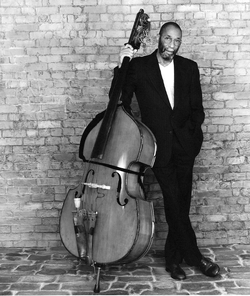The music of bassist Ron Carter is the heartbeat behind the most memorable jazz of our time. He has created 45 albums as a leader and contributed to more than 3,000 recordings with the greatest names in music, including the Miles Davis Quintet ofthe 1960s, with Miles Davis on trumpet, Herbie Hancock on piano, Wayne Shorter on tenor sax and Tony Williams at the drums. To hear this group's My Funny Valentine live at Lincoln Center in 1964 is to witness a team at its high-flying artistic peak. Ron Carter would go on to become one ofthe most prolitic and in-demand bassists ever.
Ron Carter has recently joined the legion of legends such as Louis Armstrong and Duke Ellington to be honored with the 2008 ASCAP Jazz Wall of Fame award. His music is the framework for recordings with nearly even/ name in jazz-- Chet Baker, Eric Dolphy, Bill Evans, Tommy Flanagan, Stan Getz, Dexter Gordon, Coleman Hawkins, Freddie Hubbard, Milt Jackson, Antonio Carlos Jobim, B.B. King, Michel Legrand, Wes Montgomen/ and Stanley Turrentine. His musical range also embraces the world beyond jazz to classical and pop, from stage to screen, performing with singers Jessye Norman, Lena Horne, Aretha Franklin, James Brown, Roberta Flack and A Tribe Called Quest, while also recording a solo bass album ofthe Bach Cello Suites.
When he is not performing around the world or collaborating on recordings, he is composing, teaching and writing.
Ron Carter has won two Grammy Awards, as a co-composer for Call Sheet Blues in the movie *Round Midnight and a Grammy for Best Jazz lnstrumental Performance. He has composed for numerous otherfilms including AGathering of Old Men with Louis Gossett, Junior, and The Guys with Sigourney Weaver. Ron Carter was named Most Valuable Player by the National Academy of Recording Arts and Sciences. He has lectured, conducted clinics and instructed jazz ensembles at universities even/where and led the Jazz Program as a Distinguished Professor Emeritus of Music at the City College of New York. He is on the board of directors of the Harlem Jazz Music Center.
By Dan Ouellette, author of the forthcoming book: "Finding the Right Note: The Authorized Biography of Ron Carter" scheduled for publication late this fall
The bass player: towering over the bandstand, but relegated to the back, oftentimes in the shadows. Only a timekeeper, a rhythm man, a sidekick to the spotlight artist? Think again.
Think Ron Carter. Architect of the highest order on the bass. Impromptu composer extraordinaire even when he's not soloing. Pliable but powerful. The shepherd. The instigator. The catalyst. The shaper. The finest walker in the histony of jazz. Risk-taker with an elegant streak, always. Refined. NEA Jazz Master.
"Ron's historical footprint is massive," says fellow bassist John Patitucci, "The historical statements he's made over the decades is phenomenal." He also recognizes that Ron's mystique and business-minded approach to jazz is renowned. "I've been fortunate to never be on the wrong side of Ron Carter. He is legendany about holding people accountable. He has veny high standards."
Intimidating. Gruff and at times even prickly on the outsidefunny, kind and personable to those he trusts and who have been granted the gift of knowing him.
In 2004, Ron approached me at the Jazz Journalists Association's Jazz Awards show at B.B. King's in New York and started a conversation that concluded in me agreeing to write his biography, to chronicle his storied life. Ron asked me if l were interested. l replied, I'm honored.
Four years later-after hundreds of hours of interviews with Ron, his colleagues, his family-the final project (the authorized biography of Ron Carter) is in the last stages of completion.
"Finding the Right Notes: The Authorized Biography of Ron Carter" will feature a comprehensive histony of the life and works of the legendary National Endowment of the Arts
Jazz Master, the highest honor for a musician in the U.S. The book will include full coverage of his life, including his early family life and education in Detroit, his studies at Eastman School of Music in Rochester, NY, his move to New York City in 1959 where he immediately was pegged a bass star-in-the-making, his years as a member of Miles Davis' legendany '60s quintet (deemed by many to be the greatest jazz band ever), his days as a solo artist (with CTI Records, Milestone Records and today with Blue Note Records) as well as a session player (with credit on close to 2000 albums), and his current projects that show him to be creatively vital at the age of 71. Chapters will also focus on his classical music career, his work as a film scorer, his fascination with Brazilian music and his opinions on music critics and how they too often miss the point.
I'm launching my biography with ArtistShare at my Artist Share-powered Web site danouellette.artistshare.com or danouellette.net. The project itself will be documented on an on-going basis with journal entries about the writing of the book, streaming audio and video that provide behindthe scenes looks at Ron's career, exclusive photo galle ries, and a range of other special peeks into Ron's life. You can visit my Web site danouellette.artistshare.comto get more information about the project itself and how you can help to participate in it.





